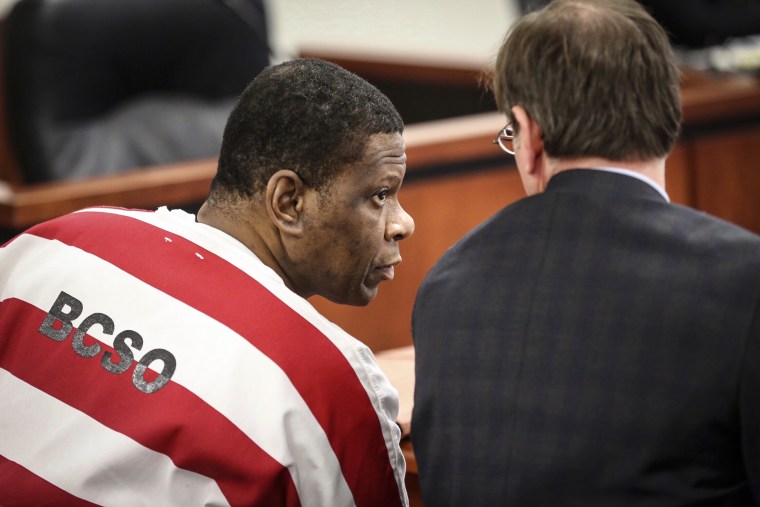Texas death row inmate Rodney Reed, a Black man who has long insisted he is innocent in the murder 25 years ago of a young white grocery store clerk, does not deserve a new trial, a judge recommended Monday, putting his fate back into the hands of the state's highest criminal court.
The 50-page ruling by state District Judge J.D. Langley, following a two-week evidentiary hearing over the summer, clears the way for the Texas Court of Criminal Appeals to similarly deny Reed's bid for another trial, although it's not unheard of for the court to go against a judge's recommendation.
Langley wrote that Reed, 53, "has not proven by clear and convincing evidence that no reasonable juror would have convicted him of capital murder."
There's no date for when the appeals court will take up the case again.
Jane Pucher, one of Reed's attorneys, said she believes a new jury deserves to hear the "overwhelming evidence of Rodney Reed's innocence."
"We hope the Court of Criminal Appeals recognizes that he should be given a new trial," Pucher, a senior staff attorney at the Innocence Project, said in a statement.
Reed's case was championed by celebrities, including reality television star Kim Kardashian West, media mogul Oprah Winfrey and the singer Rihanna, as well as a bipartisan group of Texas lawmakers in the weeks leading up to his planned execution in November 2019.
With just days before he was set to die by lethal injection, the Texas Board of Pardons and Paroles recommended that Gov. Greg Abbott grant Reed a reprieve as new witnesses and forensic evidence that were uncovered in the years since he was convicted of killing Stacey Stites, 19, cast doubt in the prosecution's case. Separately, the Court of Criminal Appeals also stepped in, halting the execution and sending the case back to the trial court for the latest claims to be reviewed.
Reed was found guilty by an all-white jury in the 1996 rape and murder of Stites, a grocery store worker in the central Texas town of Bastrop, east of Austin.
In 1998, prosecutors at the trial laid out how Reed encountered Stites on the road as she drove to work. After she stopped for him, they said, he raped and strangled her with her own belt. Stites was weeks away from getting married to a police officer named Jimmy Fennell.
Semen was found inside Stites, and police matched the DNA to that of Reed, who was arrested a year later. Reed's sperm had previously been collected as part of an unrelated sexual assault investigation.
Reed initially denied to investigators that he knew Stites. But he later explained to them why they discovered his DNA: He said he and Stites were having a clandestine and consensual sexual relationship, one that was taboo because he is Black and Stites was white.
He said they met at a game room where they played pool, and they last had sex a couple of days before her death. Reed's sperm was the only physical evidence that connected him to Stites at the crime scene.
Reed's lawyers, in calling for a new trial, pointed to new witnesses who had come forward and forensic evidence that had been re-evaluated. That includes people who had cast doubt on Reed's conviction and, in some cases, implicated Fennell, the victim's fiancé.
New witnesses included Arthur Snow Jr. who said Fennell told him during a prison yard conversation: "I had to kill my (N-word)-loving fiancée." Fennell had been imprisoned at the time for an unrelated kidnapping and sexual assault conviction, according to The Associated Press. New forensic evidence from multiple scientists who took the stand suggested Stites could have died during times that Fennell testified he had been with her.
At the evidentiary hearing, the state brought on memory expert witnesses to challenge some of the witness accounts after more than two decades, and also medical experts who said the marks on Stites' body indicated she was sexually assaulted.
"The truth is, your honor, that Rodney Reed kidnapped, brutally raped and violently murdered Stacey Stites," Assistant Attorney General Travis Bragg said in the prosecution's closing arguments last month.
Texas Attorney General Ken Paxton commended the judge's decision and said Stites' death "should not be made a mockery by the court of public opinion."
"The State's evidence was held to be credible, while deciding that Reed's defensive theory of a consensual affair lacked any credibility," Paxton said in a statement Tuesday.
Reed and his family have maintained his innocence, and a cousin of Stites had said he should be granted a new trial.


